Eternal Sunshine of the Spotless Mind (Michel Gondry, 2004)
There’s a sequence late in Spike Jonze’s Being John Malkovich where two characters chase each other through the subconscious of actor John Malkovich. The deepest recesses of memory – such as childhood and teenage humiliations – are literalised as little mini-dramas that the characters can barge into and interrupt. The sequence lasts only a couple of minutes, but it’s easy to see it as the genesis for Eternal Sunshine of the Spotless Mind, the latest film based upon a script by Malkovich screenwriter Charlie Kaufman. This time the mind we rummage through is that of Joel (Jim Carrey): a forlorn, withdrawn man whose relationship with the extroverted and impetuous Clementine (Kate Winslet) is in disarray. The central gimmick is that Joel and Clementine stumble across Lacuna, a company offering erasure of unwanted memories. Joel seizes on the chance to put the relationship literally out of mind, and the central portion of the film sees Joel wandering through his own mind and exploring his memories of the relationship even as they are extinguished one by one.
The difficulty of summarising the film is due not only to the trickiness of the concept and the film’s structure (it’s not as linear as my summary above), but also the desire not to spoil its surprises. As in Malkovich and his subsequent script for Jonze, Adaptation, Kaufman (here working from a story worked out in collaboration with Pierre Bismuth and director Michel Gondry) keeps throwing new variations on the central idea at the audience. Yet Kaufman pushes it further here, testing the audience’s willingness to accept a film that not only fails to differentiate between reality and memory, but which explores both realms in a non-linear manner. While this does mean the film is occasionally confusing (though only in a transitory sense – it all pulls together by the end), I think Kaufman’s right to do so. The mixing of illusion and reality has popped up a lot lately, in everything from The Matrix to A Beautiful Mind to Fight Club to Mulholland Drive to Dark City. With so many trying their hand at such material the simple switch between reality and illusion is almost a cliche. (Indeed, in Adaptation Kaufman’s eponymous screenwriter character tells his less talented brother how tired a similar conceit is). Kaufman shows how adept he is with this kind of script by upping the ante in terms of how complex and conceptual such material can be.
It is not the play of ideas that makes Eternal Sunshine such a step up for Kaufman, however: it’s the way that the concept-driven structure works in service of a strong, character based central story. The pleasure in Malkovich was simply enjoying the cascade of ideas: there wasn’t any investment in its rather despicable characters. And as much as I enjoyed Adaptation, you could feel the limits of its self-referential game. The fact that the characters were clearly at the mercy of the screenwriter’s cleverness diminished it, and lent a desperation to its twists and surprises. Eternal Sunshine, in contrast, is satisfying at an emotional level that Malkovich and Adaptation made no attempt to achieve. Perhaps the collaboration with Bismuth and Gondry has warmed up Kaufman’s writing. Certainly the film is more interested in human relationships: the journey through Joel and Clementine’s shared memories is full of astute, honest and heartfelt observation of a relationship with extreme highs and lows.
Carrey and Winslet are vital to this aspect of the film’s success. When Carrey first appeared in films like Dumb and Dumber I expected he would quickly exhaust his range in the way Jerry Lewis and Robin Williams did. Yet here he provides a subtle and subdued performance in what is – despite all its trappings – a serious relationship drama. (It contrasts with his excellent work in The Truman Show, where the scenario almost seemed tailored for Carrey’s manic qualities). Winslet, too, brings a vulnerability to Clementine that rounds out the character by showing the insecurity that lies underneath her impulsiveness. Gondry and Kaufman’s attention to character extends to the “outer” story covering the staff of Lacuna, which in lesser hands would have been disposable. Interestingly, they are generally very likeable, given the ethical dubiousness of the practice in which they are engaged. Tom Wilkinson, in particular, brings paternal warmth to the head of the company.
Gondry’s direction opts for a naturalism in which reality and memory blend together: he avoids the lazy signposting of the unreal that a lesser director might have opted for. This gives the memory sequences more weight, and further aids with the audience’s involvement. That the film is unexpectedly moving is one measure of the success of Kaufman and Gondry’s willingness to treat their characters with compassion. The film is also more thought provoking than those earlier Kaufman scripts, since the humanity of the characters generates an interest in the outcomes that didn’t exist in Malkovich and Adaptation. Those films weren’t open to interpretation, giving the sense that the screenwriter had already fully thought through all the implications of the premise. Eternal Sunshine is more willing to leave questions unanswered, leaving the audience to determine its own perspective on Joel and Clementine’s relationship. That we care enough to engage in such speculation is the ultimate measure of the film’s success.
